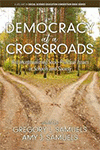
Democracy at a Crossroads
Reconceptualizing Socio-Political Issues in Schools and Society
Edited by:
Gregory L. Samuels, The University of Montevallo
Amy Samuels, The University of Montevallo
A volume in the series: Social Science Education Consortium Book Series. Editor(s): Whitney G. Blankenship, San Antonio College. Matthew T. Missias, Grand Valley State University. Anne Aydinian-Perry, University of Wyoming. Dean P. Vesperman, University of Wisconsin-River Falls.
Published 2019
At a time of questionable civility in American politics, democratic education appears to be at a crossroads. As we consider how to best explore democracy and foster a more civically-engaged populace in the current socio-political context, it is critical to examine what frames our educational systems, policies, and practices and shapes our civic identity. While teachers struggle with decreased instructional time for social studies and the demands of standardized tests, the social sciences are often pushed to the margins. Reflecting on how to negotiate local, state, national, and global tensions related to policy and practice, educators work to do what is best to equip students to foster democratic citizenship and ideals.
Social sciences educators are uniquely positioned to embrace a journey that upholds democratic ideals of equality, freedom, and justice, while simultaneously critiquing inequity and injustice in schools and our society. The contributors to this volume situate a variety of discussions within the context of the crossroads and explore how to negotiate, translate, and reconceptualize our own beliefs and positionings in ways that positively influence and empower students, teachers, teacher educators, and education policy makers. Studies are presented related to civic education, cross-cultural interpretations, emotional citizenship, international economics, and race-consciousness, as well as those that discuss how to challenge dominant narratives and negotiate educational policies and practices.
CONTENTS
Introduction, Gregory L. Samuels and Amy Samuels. Acknowledgments. School Choice Policies in Democratic Societies: Localizing the Tensions, Laura K. Handler, and Tracy
C. Rock. Conflict, Teachers, and High-Stakes Testing in Civic Education, Joshua Carey. Seeing Civics Through Visual Representations in Kindergarten Classrooms: A Cross-National Study, Ilene R. Berson, Michael J. Berson, Joyce Esi Bronteng, and Aaron Osafo-Acquah. Teachers at the Crossroads of Democracy: A Case Study of Elementary Civic Education, Tina L. Heafner and Jessica Norwood. (Re)Considering the Holocaust: Sensitive Content as a Vehicle for Emotional Citizenship, Brandon J. Haas. Remembering What We Would Rather Forget: Examining Counter-Monuments in the United States and Germany, Sara B. Demoiny and Stewart Waters. Assessing Curricular Bias: Student Resistance and the Transformative Classroom, M. Nickie Coomer, Robin G. Jackson, and Tammera S. Moore. Heritage Not Hate? Crossroads Between Racial Ideologies and Teaching, Jacob S. Bennett. The Earthquake and the Aftershock: An Autoethnography, Crista K. Banks. “Will Donald Trump Knock Our School Down if He Doesn’t Like It?” Creating and Teaching Civics Curriculum in Contentious Times, William Toledo. A Threat to Democracy in the Era of Trump, A New Phenomenon? Confronting and Knowing Democracy Through Social Studies Instruction in Elementary School Classrooms, Michael D. Bartone. Democracy, International Economics, and Current United States Trade Policy: What Citizens Need to Know, James E. Davis. Summation and Reflection—At the Crossroads: The Democratic Journey, Charles S. White. About the Editors. About the Contributors.
-
Paperback9781641137164
Web price: $45.04 (Reg. 52.99)
-
Hardcover9781641137171
Web price: $80.74 (Reg. 94.99)
- eBook9781641137188

- EDU000000 - EDUCATION: General
- EDU029040 - EDUCATION: TEACHING METHODS & MATERIALS: Social Science
- SOC000000 - SOCIAL SCIENCE: General
-
 (Re)Envisioning Social Studies Education Research
Current Epistemological and Methodological Expansions, Deconstructions, and Creations
(Re)Envisioning Social Studies Education Research
Current Epistemological and Methodological Expansions, Deconstructions, and Creations
-
 Beyond Single Stories
Changing Narratives for a Changing World
Beyond Single Stories
Changing Narratives for a Changing World
-
 Distance Learning
Volume 20 #4
Distance Learning
Volume 20 #4
-
 Fostering Diversity and Inclusion in the Social Sciences
Fostering Diversity and Inclusion in the Social Sciences
-
 Healing While Studying
Reflections and Strategies for Healing, Coping, and Liberation of Graduate Students of Minoritized Identities
Healing While Studying
Reflections and Strategies for Healing, Coping, and Liberation of Graduate Students of Minoritized Identities
-
 Out of Turmoil
Catalysts for Re-learning, Re-Teaching, and Re-imagining History and Social Science
Out of Turmoil
Catalysts for Re-learning, Re-Teaching, and Re-imagining History and Social Science
-
 The Divide Within
Intersections of Realities, Facts, Theories, and Practices
The Divide Within
Intersections of Realities, Facts, Theories, and Practices

